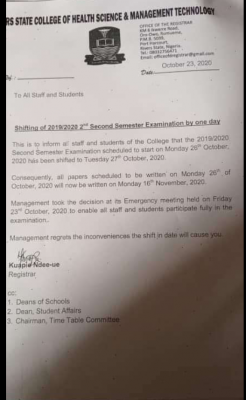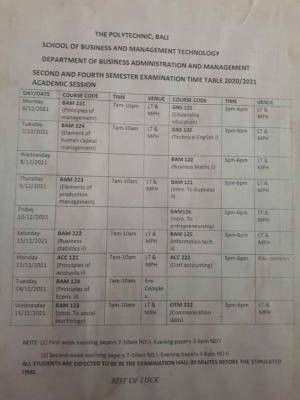
The hasty manner in which students have to sit for examinations, following the recent strike by lecturers, seems to strengthen fears surrounding worth of degrees in Nigeria.
From the University of Lagos, Enugu State University of Science and Technology, University of Jos, to the University of Port Harcourt in Rivers State, students are busy writing one form of examination or another.
An examination at whatever level — primary, secondary or tertiary — is not an interesting exercise. Little wonder, some stakeholders say this is a ‘crisis’ period for many pupils and students. For some others, this a period that exposes the students to nervous strain. It is a period that usually throws up their emotional and psychological problems.
A 400-level Law undergraduate of UNILAG, Yemi Adegoke, attests to this. He says, “There is usually a constant and sure fear within this period on campus. For me, a fear that comes from nowhere would usually grip me this period. I may look reserved and unshakeable on the outside, but what is going on in me can scare an empire.”
The young man, who just finished his examination last week, says it was stressful.
“In short, many times, I went blank in the hall. In fact, I struggled to exhaust my answer booklets in a few of the courses,” he says.
Another student of the institution, Vincent Obia, adds, “Writing my second semester examination was not easy for me. It came just after the Yuletide and the fact that we were practically rushed into the exams proved to be very challenging.
“We had three weeks to conclude our lectures before the exams. Two weeks were meant to be for lectures, while the third was to be lecture-free. But this was not the case as lectures continued into the third week. In fact, some assignments were postponed till after the exams.”
This predicament is not peculiar to Adegoke and Obia. Really, not many students would want to pass through this inevitable step in attaining academic glory and perhaps success in life. Not even with the ‘rush’ that is currently the lot of the nation’s public universities. It is therefore not surprising that on campuses many social activities are literally on hold within this period.
Societies and clubs, such as Jaycees and Rotaract, suspend meetings until further notice, as many students move around looking drained and withdrawn. In fact, observers say last Friday Valentine’s Day celebration in many of the Nigerian universities were dull, as many students were preoccupied with their studies and examinations.
Beyond this psychological trauma, many stakeholders are wont to question the worth of the certificates and education that students receive in recent times, given the disruption in the nation’s education system, particularly at the tertiary level.
For instance, that many of the institutions at present are writing their examinations is because of the strike embarked upon by the Academic Staff Union of Universities last year. The strike, which started on July 1, ended on December 17, 2013. It lasted for 169 days. Again, following the closeness of the Christmas and New Year celebrations to the end of the strike, many schools deferred their resumption till January, 2014.
Many of the nation’s polytechnics and colleges of education have also been on strike since late last year. Their lecturers are protesting against the poor funding of the sector, among other issues.
Besides the recurring strikes, analysts also argue that the environment is not right for quality learning and scholarship. According to them, with decayed and dilapidation infrastructure as well as inadequate funding, reaching the zenith of scholarship in the nation’s public institutions is a Herculean mission.
In fact, some posit that what the students do, especially at this ‘rush hour’, is just to regurgitate lecture materials without consideration for a deeper analysis. The “rush system”, analysts further argue, destroys creativity and originality — which they say is the hallmark of education. All of these are contributory factors to why some analysts hold the view that the value of the certificates Nigerian students receive is of major concern to them.
Particularly for a non-governmental group, Education Rights Campaign, the idea of “rushing” students to write examinations shortly after the long strike is unacceptable. The essence of the hurried examinations, the ERC President Taiwo Hassan says, is to expose the students to landmines and mass failure.
He adds, “I wonder how the students will perform well with this approach. If the purpose is not to punish students, the proper thing to do is to give them enough time to prepare for the examinations. It is not an accident that most universities are rushing their students for examinations. The design abinitio by the Federal Government and the respective university managements is to punish students, who they feel supported the strike by ASUU.”
But a lecturer at the University of Nigeria, Nsukka, Dr. Fidelis Okoro, disagrees with Hassan, saying no institution will go out to victimise its students academically. Using UNN as an example, he notes that the school had even started its examinations before the commencement of the strike. According to him, it is only natural that the students would, on resumption, start where they stopped before the industrial action.
Okoro, nonetheless, admits that for the training of well-grounded students, there must be consistency in their studies. Okoro, who notes that incessant strikes are not good for the system, says the Federal Government should take a greater part of the blame.
He notes, “Funding is at the core of all these things. If the Federal Government gives less allocation to education, it affects everything in the sector. The use of stoves in many science laboratories in this 21st century takes the students back to the Stone Age. Information communication and technology is vital in this era, but many universities do not have the heavy bandwidth to enable their lecturers and students to access information. This, no doubt, affects the quality of education that students receive.”
But, in the thinking of an education consultant, Tunde Kolade, many things are wrong in the sector. According to him, the nation’s tertiary institutions do not have in-built quality control to check the happenings in the system.
He says, “The universities need to reinvent themselves to be relevant in this age. There are no functional and effective mechanisms to check the activities of lecturers. Our lecturers are resisting reforms that question the quality of what they are bringing to the table. We also need to step up the campaign to increase access to education in the country.
“Again, usually in the universities, lectures are rushed. The implication of this is that learning is not really taking place. Our universities are structured for writing examinations. There are no means of assessing whether or not quality learning is taking place. So, all of these compound the crisis in the system.”



